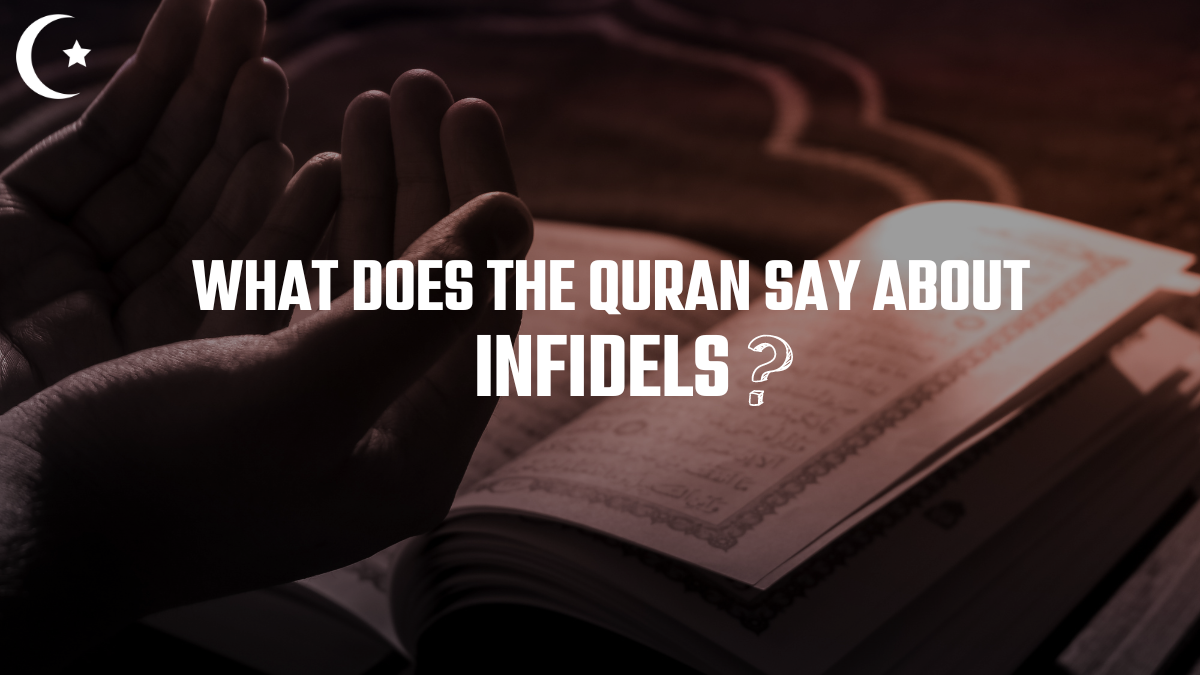In our world today, what if the Quran’s teachings on infidels were different from what you thought? Many people link the Quran with violence, especially when they look at verses like Quran 2:191 and Quran 9:5. But these interpretations often miss the key context that totally changes their meaning. What Does The Quran Say About Infidels? Let’s find out.

This article aims to show the true meaning of ‘infidel’ in Islamic texts. We’ll look at the historical and situational background of the violence-related verses. By taking a balanced view, we’ll show how some critics wrongly interpret the Quran. We’ll also highlight verses that actually encourage peace and living together with different beliefs. Let’s explore these important topics and challenge the common beliefs about infidels in the Quran.
Understanding the Term “Infidel” in Context
The word “infidel” can bring up strong feelings and different meanings, especially when we talk about the Quran. To really get what “infidel” means, we need to look at its history and religious background. Often, “kafir,” which is often called infidel, means more than just not believing in Allah. It can also mean rejecting some faith principles openly.
In the Quran, we see a complex view of infidels. It talks about people from different faiths, like Jews and Christians, and stresses the need for respectful conversation, not fighting. This shows the Quran doesn’t call for violence against all non-believers. Instead, it promotes living together and being tolerant with different religious groups.
Looking at history, we see how Muslims and non-Muslims interacted in the Islamic Empire. “People of the book” were often protected and could keep their faith, but they had to pay taxes. This shows that applying Quranic teachings on infidels is complex. It requires careful thought to truly grasp its meaning.
The Historical Context of Quranic Verses on Violence
Understanding the historical context of Quranic verses on violence is key to their meaning. These verses came about during the early days of Islam, when Muslims faced a lot of challenges. They were migrating from Mecca to Medina and faced harsh opposition from pagan tribes.
Some verses were written in response to the aggression against early Muslim communities. For instance, Quran 9:5 is often talked about for its stance on violence. It was written about certain Arabian tribes that broke their promises, leading to defensive actions. Quran 2:191-193 also talks about fighting to ensure the right to worship Allah freely. But these verses shouldn’t be seen as a call to attack all non-believers.
Many scholars disagree with the idea that Islam is a violent religion. They say the interpretation of Quranic violence varies a lot. Some believe many verses support violence, while others see them as promoting peace with the right to defend oneself.
The Quran also talks about living in peace and respecting others’ beliefs. It says there should be no force in matters of faith. This shows that Quranic teachings might support defending oneself, but not attacking others without a good reason.
What Does The Quran Say About Infidels
The Quran uses the terms “Kafir” and “infidel” in different ways. “Kafir” means someone who knows the truth but rejects it. “Infidel” is a wider term for anyone not in the Islamic faith. Knowing this helps us understand the Quran’s views on non-believers better.
The Meaning of Kafir vs. Infidel
“Kafir” means more than just not believing in Islam. It means actively denying the truth Islam teaches. “Infidel,” on the other hand, can include Jews, Christians, and atheists. Understanding this helps us see what the Quran means when it talks about infidels.
Key Verses Referencing Infidels
Some Quran verses talk about infidels. For example, Surah Al-Baqarah 2:191 and Surah Al-Tawbah 9:5 seem to suggest violence against them. But we must look at the context. These verses were written during a specific time in Muhammad’s life. How we interpret them today can change how Muslims act.
The Importance of Context in Quranic Interpretation
Understanding the Quran’s verses means looking closely at the situations they were written in. This is clear in Surah Al-Baqarah and Surah Al-Tawbah. These surahs show how the context helps us grasp the true meaning of the verses.
Context is key in interpreting the Quran. It helps us see how the texts apply in different situations.
Contextual Analysis of Surah Al-Baqarah 2:191
Surah Al-Baqarah 2:191 is often talked about when discussing violence. But, it’s important to know the situation Muslims were in back then. They were fighting mainly to protect themselves from attacks.
This verse is often misunderstood. It’s seen as encouraging violence without a reason. But, when we look at the situation, we see it was about self-defense.
Understanding Surah Al-Tawbah 9:5
Surah Al-Tawbah 9:5 talks about certain tribes that broke their promises to Muslims. This verse shows how Muslims reacted to this betrayal. It’s not a call to fight all non-believers.
Looking at this verse closely, we see it’s about dealing with specific problems. This helps us understand the Quran better. It shows the importance of peace and justice in the Quran.
Criticism of Quranic Interpretations on Violence
Debates about the Quran often focus on a few verses that seem to support violence. Critics pick these verses out of context, leading to wrong interpretations. When we look closer, we see many verses that seem violent actually have conditions. These conditions talk about justice and defending oneself.
Rebutting Claims of Encouragement for Violence
Many think the Quran encourages violence, but this is not true. It teaches fighting only when you’re defending yourself or against those who attack first. In the early days of Islam, battles were mainly between armies, not civilians. Muslims were told not to harm innocent people or destroy their property during these battles.
This shows the Quran doesn’t tell Muslims to attack all non-Muslims without a reason.
The Common Misuse of Quranic Verses
Some verses in the Quran are taken the wrong way, leading to violence claims against Islam. For instance, 2:190-193 talk about defending your faith, not starting fights. Verses like 9:5 and 8:12-17 are often misunderstood as calling for war against all non-believers. But, if we look closer, we see these verses were meant for specific situations.
Many Muslim leaders throughout history have chosen to live in peace with other religions. They respected other faiths so much that they protected sacred sites in Jerusalem. For more on how these verses should be understood, check out this detailed analysis.
Islam’s Stance on Peace and Forgiveness
Islam teaches values that focus on peace and forgiveness. It tells followers to work for harmony in their communities and with people of other faiths. The Quran’s teachings stress kindness, asking followers to be kind to everyone, no matter their background.
Differentiating Between Historical and Contemporary Islam
In the past, Islam has seen conflicts. But today, it’s more about peace. Many Muslims see their faith as a call to live in harmony with others. This shows how Islam’s teachings of compassion and forgiveness aim for peace, not conflict.
Quranic Verses Promoting Kindness
The Quran has many verses on kindness. For example, Surah 76:8-9 tells believers to help those in need. This kind of giving builds strong community and interfaith bonds. It helps create a world where peace and forgiveness lead to better understanding among everyone.
The Treatment of Non-Muslims in Islam
The Quran gives clear guidance on how to treat non-Muslims, especially the “People of the Book,” which includes Jews and Christians. It teaches us to respect and engage with them through dialogue.
Quranic Guidance on Interfaith Relations
Many verses stress the need for kindness when dealing with non-Muslims. For example, Surah 29:46 encourages peaceful talks and understanding over conflict. This approach shows how Muslims should live with others, based on kindness and respect.
Significance of “People of the Book”
The term “People of the Book” is very important in Islamic teachings. It recognizes those with religious texts and opens doors for working together and understanding between faiths. The Quran says these groups deserve respect, setting a base for building good relationships with others based on shared values.
Modern Misconceptions Around Quranic Texts
Many people today misunderstand the Quran because of selective readings that twist its true meaning. Politicians and media often add to this by sharing wrong interpretations. These wrong views spread fear and confusion in society.
Looking closely at Chapter 9, Verse 5 shows us rules for polytheists, like killing or capturing under certain conditions. These rules were made because early Muslims were badly treated in Mecca. We must remember this history to understand the Quran right.
It’s easy to lose sight of the original context when translating Quranic texts. For example, some verses talk about war but fit into a larger story found in many religious texts. These texts show Prophet Muhammad’s mercy, like when he let people go free after taking Mecca in 630 AD.
Culture and differences within Islam also make it hard to understand. The Sunni majority, making up about 90% of Muslims, sees the Quran differently than the Shia minority. Misunderstandings like taqiyya, which lets Muslims hide their faith, affect how different groups see loyalty and truth.
It’s crucial to clear up these misconceptions to improve dialogue and get a true grasp of the Quran’s teachings on infidels and peace in Islam.
The Role of Quranic Teachings in Today’s World
Modern interpretations of Quranic verses are key in shaping today’s view of Islam. Many Muslims focus on the Quran’s teachings of compassion, peace, and justice. These views stress personal spiritual growth and the need for dialogue and living together peacefully.
The Quran urges believers to be kind and respect everyone. This shows the importance of treating all people as brothers.
How Muslims Interpret These Verses Today
Today, understanding Quranic teachings has changed a lot. Muslims aim to spread a message of love and acceptance. They fight against extremist views that wrongly show Islam as a violent religion.
Extremism distorts the true message of Islam, making people think it’s all about violence and terror. Muslims work hard to show that their faith teaches mercy and forgiveness. They want to change the view of Islam as a peaceful religion that rejects violence.
Influence of Extremism on Public Perception
Extremism badly affects how people see all Muslims. Extremists use Islam for their own goals, making people think Islam is violent. To fix this, many Muslims explain that the Quran teaches about justice and kindness.
They say the Quran supports talking things out and solving problems peacefully. For more on this, check out taqiyya. It shows how some teachings are twisted by extremists. Through learning and talking, Muslims try to clear up wrong ideas and show the true nature of their faith.

Conclusion: Navigating the Complexities of Quranic Messaging
The Quran’s messages about infidels are complex and need careful thought. We learn a lot from the early days of Islam and the challenges faced by its followers. This helps us understand Islam’s true teachings about living in peace with others.
Old translations of the Quran often had negative views of non-Muslims. Scholars like Muhammad Marmaduke Pickthall and Abdullah Yusuf Ali changed this with accurate Muslim translations. Their work shows how important it is to understand the context of the Quran to truly grasp its teachings.
Today, we face a lot of division because of political talk that spreads fear. It’s crucial to focus on the Quran’s messages of kindness and forgiveness. By understanding these messages, we can fight against Islamophobia and work towards global harmony.
FAQ
What Does The Quran Say About Infidels?
Are there verses in the Quran that promote violence against infidels?
How does the Quran distinguish between “kafir” and “infidel”?
What are some key verses referencing non-believers?
How should we interpret Surah Al-Baqarah 2:191?
Why is context important in interpreting the Quran?
What does the Quran say about peace and forgiveness?
How does the Quran guide interactions with non-Muslims?
What are some modern misconceptions about Quranic texts?
How are Quranic teachings interpreted in today’s world?

Embracing Faith, One Insight at a Time!
The teachings of the Quran have always guided my path. With a deep passion for Islamic knowledge, I strive to blend the wisdom of tradition with the relevance of today, making the timeless messages of Islam accessible and meaningful for everyone.
Muslim Culture Hub is my platform to share historical insights and thought-provoking articles, exploring both well-known and lesser-discussed aspects of Islamic culture and beliefs. My mission is to create an inclusive online space where everyone can learn, strengthen their faith, and connect with the profound message of Islam.
Join the journey!
May peace be upon you.








